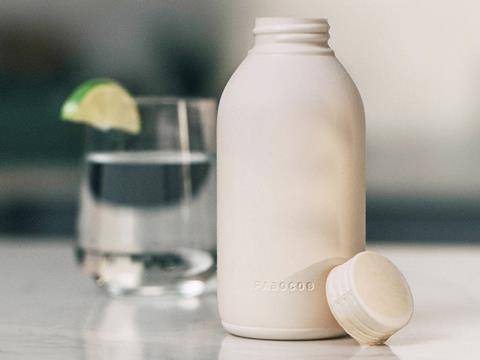
Last month, ALPLA announced that it had succeeded Billerud as the principal stakeholder in Paboco and would begin expanding its production capabilities, with the aim of creating a completely recyclable paper bottle by the end of 2024. To learn more, we spoke with Christian Zmölnig, Director Corporate Research, Development and Innovation at ALPLA and Chairman of the Board of Directors at Paboco.
For the benefit of members of our audience who may have missed it, could you give us an overview of this latest news?
Paboco develops bio-based packaging solutions made from pulp. The Danish joint venture was founded in 2019 by ALPLA and pulp and paper manufacturer Billerud. ALPLA has now took over Billerud’s shares and, as majority shareholder, is investing in scaling manufacturing capacity.
Why did ALPLA decide to make this move? What potential does it see in Paboco and paper bottles in general?
We had the chance to become majority owners here and we took it. We firmly believe in the future of complementary packaging solutions made from materials other than plastic for specific applications and target groups.
And how will this investment change how Paboco operates? Are there any key objectives or goals you can share with us?
The new structure allows us to move even closer together and continue to support and advise Paboco on its way to scalability of their products. In this step, we can bring in our extensive technology know-how and customer access.
Therefore, we are investing in scaling manufacturing capacity. Paboco plans to produce a fully recyclable paper bottle at a new state-of-the-art manufacturing site in Denmark from the end of 2024.
I think it’s fair to say that most people associate ALPLA with plastics – indeed, the company describes itself as “a world leader in the development and production of plastic packaging solutions.” In light of this then, why has it decided to branch out into paper-based solutions?
It is very clear that plastic packaging, with its numerous advantages in terms of safety, affordability and sustainability, is the basis for our high standard of living and the means of choice for solving the social requirements of the future.
Complementary to our numerous plastic packaging solutions, in our “Replace” research field we work intensively on alternative materials, including fiber-based packaging.
We are initially aiming at smaller, more exclusive target groups and see the paper bottle already in certain applications. The scalability will then also become apparent in terms of physical performance and affordability.
What are some of the key markets/end uses that you see paper bottles fulfilling a demand for?
With the actual bottle configuration Paboco is targeting the beauty and fabric and home-care segment. Initially, the choice has been driven by technology performance achievements and a comparison to the alternative packaging used within the sector – here there is a strong benefit in emissions reduction by replacing plastics with paper bottles.
We are highly optimistic that the paper bottle will have application also for other markets, like for the beverage industry, as Paboco is working with industry leaders in this area – especially those among Paboco’s Pioneer Community to develop paper bottles for their respective areas
If you liked this article, you might also enjoy:
The L’Oréal approach to packaging sustainability
The way we talk about plastic needs to change – here’s how to get it right
What steps is Apple taking to make its packaging more sustainable?














No comments yet